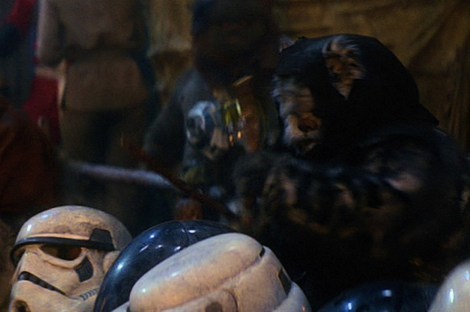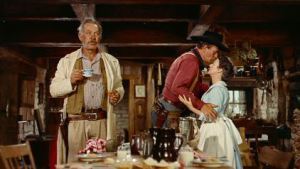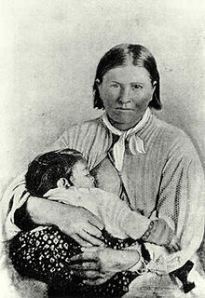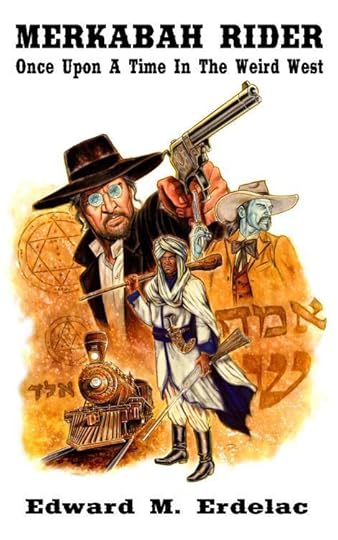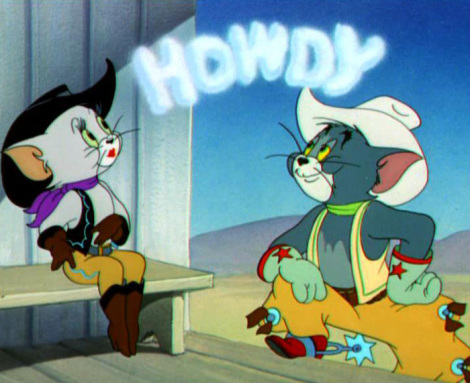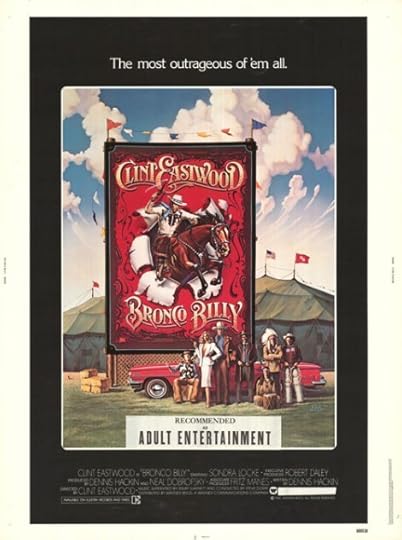Edward M. Erdelac's Blog, page 25
January 31, 2014
DT Moviehouse Review: Buffalo Soldiers
Time once more for my blog feature, DT Moviehouse Reviews, in which I make my way alphabetically through my 200+ DVD/Blu-Ray collection (you can see the list right here) and decide if each one was worth the money. Today I review Gregor Jordan’s indie flick, Buffalo Soldiers.
Directed by Gregor Jordan
Screenplay by Gregor Jordan, Eric Axel Weiss, and Nora Maccoby.
Tagline: Steal all that you can steal.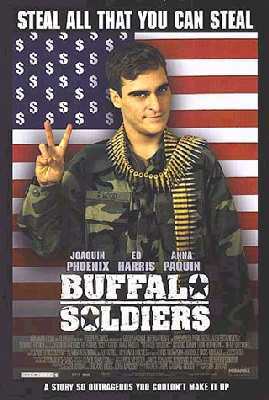
What It’s About:
As the Cold War winds down in West Germany, an unscrupulous and opportunistic Army supply clerk, Ray Elwood (Joaquin Phoenix), commands a booming black market trade in surplus material and home cooked heroin under the nose of his oblivious commander (Ed Harris). When a hardnosed new top sergeant (Scott Glenn) arrives and threatens Elwood’s operation in the midst of his biggest deal ever, he complicates things by getting involved with the man’s rebellious daughter (Anna Paquin).
Why I Bought It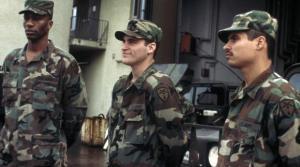 There’s an inherent absurdity to the uniformity and philosophy of military service which the occasional work brings to light amid the admittedly more appealing fanfare and ass kicking that’s prevalent in examinations of the subject. Literature tends to get away with it a bit more. Joseph Heller’s Catch 22 comes to mind, but there are a few movies too – the adaptation of Catch 22, MASH, Jarhead, Stripes, elements of Full Metal Jacket and Apocalypse Now. Maybe in movies it’s harder to get away with because if you want a realistic portrayal of the military you usually have to involve them in the production? I don’t know. If that were true, I doubt Buffalo Soldiers would ever have been made. But then again, it too, like Full Metal Jacket and Jarhead, was a book first.
There’s an inherent absurdity to the uniformity and philosophy of military service which the occasional work brings to light amid the admittedly more appealing fanfare and ass kicking that’s prevalent in examinations of the subject. Literature tends to get away with it a bit more. Joseph Heller’s Catch 22 comes to mind, but there are a few movies too – the adaptation of Catch 22, MASH, Jarhead, Stripes, elements of Full Metal Jacket and Apocalypse Now. Maybe in movies it’s harder to get away with because if you want a realistic portrayal of the military you usually have to involve them in the production? I don’t know. If that were true, I doubt Buffalo Soldiers would ever have been made. But then again, it too, like Full Metal Jacket and Jarhead, was a book first.
Like Jarhead, its main subject is the activities of America’s warriors in peacetime, in this case, on a secure base in Stuttgart months before the fall of the Berlin Wall (as it unfolds on the news, several of the stoned soldiers profess to not even knowing what country the Wall is in). Like Catch 22, it focuses on the black marketeering of soldiers, in this case, Elwood and his cronies (the always great Michael Pena, Michael Wright, and later, Gabriel Mann), who use their influence as supply clerks to divert surplus into the hands of dubious German buyers and make enough to keep them in Rollexes cooking heroin on base.
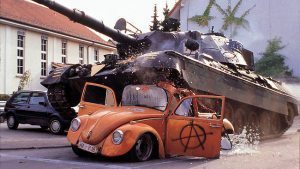 Elwood isn’t Sgt. Bilko. He’s a manipulative, mostly amoral, but highly intelligent individual who chose enlistment over a prison stint, and whose criminal leanings aren’t overly affected by his service. He plays his commanding officer, the earnest but ineffectual Colonel Berman, like a more successful Eddie Haskell, playing the part of a loyal and attentive assistant while sleeping with Berman’s wife (among all his other criminal activities). What’s appealing to me about Elwood’s character is what Anna Paquin’s Robyn calls out about him at one point – he’s bored, and he seems to be doing everything he’s doing more out relieving that boredom rather than true malice. Instead of knuckling down at the appearance of a new top sergeant obviously there to investigate rumors of his activities, he dates the man’s daughter. When, in one hilarious sequence, a seriously stoned tank crew out on maneuvers goes on an accidental rampage that results in the death of two Army truck drivers, Elwood orders his boys to confiscate and hide the trucks full of guns rather than turn them in, and sets out to make a five million dollar deal and ‘retire.’ The tank crew is never brought to justice, or even mentioned again.
Elwood isn’t Sgt. Bilko. He’s a manipulative, mostly amoral, but highly intelligent individual who chose enlistment over a prison stint, and whose criminal leanings aren’t overly affected by his service. He plays his commanding officer, the earnest but ineffectual Colonel Berman, like a more successful Eddie Haskell, playing the part of a loyal and attentive assistant while sleeping with Berman’s wife (among all his other criminal activities). What’s appealing to me about Elwood’s character is what Anna Paquin’s Robyn calls out about him at one point – he’s bored, and he seems to be doing everything he’s doing more out relieving that boredom rather than true malice. Instead of knuckling down at the appearance of a new top sergeant obviously there to investigate rumors of his activities, he dates the man’s daughter. When, in one hilarious sequence, a seriously stoned tank crew out on maneuvers goes on an accidental rampage that results in the death of two Army truck drivers, Elwood orders his boys to confiscate and hide the trucks full of guns rather than turn them in, and sets out to make a five million dollar deal and ‘retire.’ The tank crew is never brought to justice, or even mentioned again.
The plot is intricate and replete with enough double crosses to keep your attention. Of course when Elwood goes for the big score the noose tightens, not only with Sgt. Lee (Glenn), but also with Turkish criminals, Russian interlopers, and the base’s own gang-like military police, led by the bullying, opportunistic, staunchly vegetarian (!) Sgt. Saad (Sheik Mahmud-Bey). Seeing how Elwood gets out of his predicaments is part of the fun. There are some nice surprises, and a clever bit of table turning involving the heroin cooking and Saad’s refusal to eat meat that’s pretty cool.
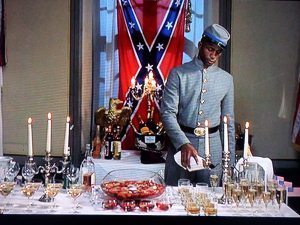 More than blackly humorous, I would say in parts, it’s blackly hilarious. There is a subplot in which Berman vies for promotion with a rival, Colonel Marshall (Brian Delate) and throws a dinner party celebrating the revelation that he’s related to an obscure Confederate war hero (The Iron Boar) to impress his CO, General Lancaster, played by Dean Stockwell. Of course Marshall’s own ancestor George C. Marshall turns out to be more impressive, and when Colonel Marshall disparages Hood by wondering aloud if he lost both an arm and a leg in some military disaster of his own making, Berman splutters “He didn’t lose the arm. He lost the use of it.” As Berman quickly learns that General Lancaster is unimpressed with fancy relations, Sgt. Lee assigns Elwood and Stoney (Leon Robinson) to man the punch table in Confederate uniforms in front of a Stars and Bars flag on the wall – something Stoney, who is black, is obviously not happy about. Elwood and his boys hide their illegal weapons in a nuclear facility on base, which Berman decides to use as a setting for a grand war game to pit his men (which includes Elwood and friends) against Marshall’s, ostensibly to woo Lancaster’s favor. Of course the whole thing’s going down the same day Elwood needs to move the guns under threat of death from the Turks, and Garcia (Pena) remarks, “If we’re not dead by 1700, we’re fuckin’ dead!” The interplay of Lee and Elwood as the investigation intensifies if pretty humorous. At one point Lee confiscates Elwood’s civilian automobile for a live fire exercise and orders Elwood to blow up his own vehicle with an M-60.
More than blackly humorous, I would say in parts, it’s blackly hilarious. There is a subplot in which Berman vies for promotion with a rival, Colonel Marshall (Brian Delate) and throws a dinner party celebrating the revelation that he’s related to an obscure Confederate war hero (The Iron Boar) to impress his CO, General Lancaster, played by Dean Stockwell. Of course Marshall’s own ancestor George C. Marshall turns out to be more impressive, and when Colonel Marshall disparages Hood by wondering aloud if he lost both an arm and a leg in some military disaster of his own making, Berman splutters “He didn’t lose the arm. He lost the use of it.” As Berman quickly learns that General Lancaster is unimpressed with fancy relations, Sgt. Lee assigns Elwood and Stoney (Leon Robinson) to man the punch table in Confederate uniforms in front of a Stars and Bars flag on the wall – something Stoney, who is black, is obviously not happy about. Elwood and his boys hide their illegal weapons in a nuclear facility on base, which Berman decides to use as a setting for a grand war game to pit his men (which includes Elwood and friends) against Marshall’s, ostensibly to woo Lancaster’s favor. Of course the whole thing’s going down the same day Elwood needs to move the guns under threat of death from the Turks, and Garcia (Pena) remarks, “If we’re not dead by 1700, we’re fuckin’ dead!” The interplay of Lee and Elwood as the investigation intensifies if pretty humorous. At one point Lee confiscates Elwood’s civilian automobile for a live fire exercise and orders Elwood to blow up his own vehicle with an M-60.
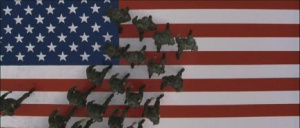 The whole movie has a very slick, indie gangster feel, with a great classic hip hop soundtrack. There are some excellent compositions. An early one where the soldiers march across a Patton-esque US flag painted on the ground, and Elwood’s portentous dreams of falling (unlike most people, in his falling dream he always hits the ground) are beautifully filmed. I’m surprised this flick doesn’t have a better reputation. Apparently its release, too critical of the United States military, was pre-empted for two years following the September 11th Attacks, I guess because nobody wanted to speak bad about the military then.
The whole movie has a very slick, indie gangster feel, with a great classic hip hop soundtrack. There are some excellent compositions. An early one where the soldiers march across a Patton-esque US flag painted on the ground, and Elwood’s portentous dreams of falling (unlike most people, in his falling dream he always hits the ground) are beautifully filmed. I’m surprised this flick doesn’t have a better reputation. Apparently its release, too critical of the United States military, was pre-empted for two years following the September 11th Attacks, I guess because nobody wanted to speak bad about the military then.
I had forgotten how much I liked it.
Best Dialogue/Line:
In an early scene, when a soldier accidentally kills himself playing football in the barracks, Elwood drafts a letter home to the deceased kid’s parents, trying to put a spin on his foolish demise as Berman listens. The Colonel’s only critique -
“The word ‘resplendent.’ I don’t think that’s a good word to describe a soldier. What about….contained? In him were contained the virtues of honor and loyalty. That’s much better, don’t you think?”
“Oh much better, sir.”
“Scrap ‘resplendent.’ Don’t let that word leave this base.”
Best Scene:
I think the climactic threeway clash of Garcia and Elwood’s heroin cookers, Saad’s MP’s, and Sgt. Lee’s strike team in a room full of overcooking heroin as the fall of the Berlin wall plays out on an overturned TV was particularly cool. The fumes start getting all the combatants ridiculously high, yet they still push on with their fight, smiling faintly as they shoot and plunge combat knives into each other. Very chilling, and juxtaposed with Elwood battling the homicidal Lee as he narrates a Nietczhe quote and likens it to an inherent inability for men to avoid going to war, the whole thing in hindsight seems almost to condemn a war that had not yet begun, one which we’re still fighting today.
I can see why it wasn’t released.
Next In The Queue: A Bullet For The General


January 23, 2014
Happy Belated Birthday, Robert E. Howard
Yesterday was Robert E. Howard’s birthday. I usually mark the birthdays of my favorite writers with a post, or an excerpt from some of their work, which is the best way I think, to celebrate them.
With all the Star Wars stuff the past couple days, I let it slip by (sorry, Bob!).
Usually a writer of titanic bloodshed and brooding violence, Howard also had a fun streak which I discovered some years ago when I tracked down a copy of A Gent From Bear Creek and read the stories aloud to my wife at bedtime. I’m in a good mood this week, so I thought I’d post something from the lighter side of REH.
The simple set up is, Breck Elkins, an overgrown backwoods battler, wants badly to court Glory McGraw. But her dang it, her family keeps getting in the way….
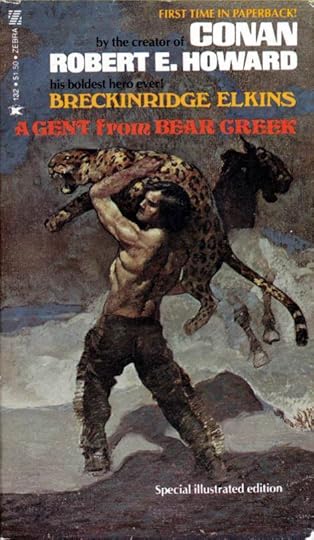 “Lemme handle him,” snarled Mister Wilkinson. “Git outa the way and gimme a clean shot at him. Lissen here, you jack-eared mountain-mule, air you goin’ out of here perpendicular, or does you prefer to go horizontal?”
“Lemme handle him,” snarled Mister Wilkinson. “Git outa the way and gimme a clean shot at him. Lissen here, you jack-eared mountain-mule, air you goin’ out of here perpendicular, or does you prefer to go horizontal?”
“Open the ball whenever you feels lucky, you stripe-bellied polecat!” I retorted courteously, and he give a snarl and went for his gun, but I got mine out first and shot it out of his hand along with one of his fingers before he could pull his trigger.
He give a howl and staggered back agen the wall, glaring wildly at me, and at the blood dripping off his hand, and I stuck my old cap-and-ball .44 back in the scabbard and said: “You may be accounted a fast gunslinger down in the low country, but yo’re tolerable slow on the draw to be foolin’ around Bear Creek. You better go on home now,
and–”
It was at this moment that Old Man McGraw hit me over the head with his poker. He swung it with both hands as hard as he could, and if I hadn’t had on my coonskin cap I bet it would have skint my head some. As it was it knocked me to my knees, me being off-guard that way, and his three boys run in and started beating me with chairs and benches and a table laig. Well, I didn’t want to hurt none of Glory’s kin, but I had bit my tongue when the old man hit me with his poker, and that always did irritate me. Anyway, I seen they warn’t no use arguing with them fool boys. They was out for blood–mine, to be exact.
So I riz up and taken Joe by the neck and crotch and throwed him through a winder as gentle as I could, but I forgot about the hickory-wood bars which was nailed acrost it to keep the bears out. He took ‘em along with him, and that was how he got skint up like he did. I heard Glory let out a scream outside, and would have hollered out to let her know I was all right and for her not to worry about me, but just as I opened my mouth to do it, John jammed the butt-end of a table laig into it.
Sech treatment would try the patience of a saint, still and all I didn’t really intend to hit John as hard as I did. How was I to know a tap like I give him would knock him through the door and dislocate his jawbone?
Old Man McGraw was dancing around trying to get another whack at me with his bent poker without hitting Bill which was hammering me over the head with a chair, but Mister Wilkinson warn’t taking no part in the fray. He was backed up agen a wall with a wild look on his face. I reckon he warn’t used to Bear Creek squabbles.
I taken the chair away from Bill and busted it over his head jest to kinda cool him off a little, and jest then Old Man McGraw made another swipe at me with his poker, but I ducked and grabbed him, and Bill stooped over to pick up a bowie knife which had fell out of somebody’s boot. His back was towards me so I planted my moccasin in the seat of his britches with considerable force and he shot head-first through the door with a despairing howl. Somebody else screamed too, that sounded like Glory. I didn’t know at the time I that she was running up to the door and was knocked down by Bill as he catapulted into the yard.
I couldn’t see what was going on outside, and Old Man McGraw was chawing my thumb and feeling for my eye, so I throwed him after John and Bill, and he’s a liar when he said I aimed him at that rain-barrel a-purpose. I didn’t even know they was one there till I heard the crash as his head went through the staves.
I turned around to have some more words with Mister Wilkinson, but he jumped through the winder I’d throwed Joe through, and when I tried to foller him, I couldn’t get my shoulders through. So I run out at the door and Glory met me just as I hit the yard and she give me a slap in the face that sounded like a beaver hitting a mud bank with
his tail.
“Why, Glory!” I says, dumbfounded, because her blue eyes was blazing, and her yaller hair was nigh standing on end. She was so mad she was crying and that’s the first time I ever knowed she could cry. “What’s the matter? What’ve I did?”


January 22, 2014
Part 2 of Slugthrowers: An Overview Of Popular Music and Musicians Up At Star Wars Dot Com
In the immediate wake of my story Hammer in Star Wars Insider #147, look want else got published today…more Star Wars! Part 2 of my article Slugthrowers: An Overview of Popular Music And Musicians In A Galaxy Far Far Away is up on Lucasfilm’s Star Wars (dot) com.
And here’s part 2….
http://starwarsblog.starwars.com/2014/01/21/slugthrowers-part-2/


January 21, 2014
Hammer Time! Star Wars Insider #147
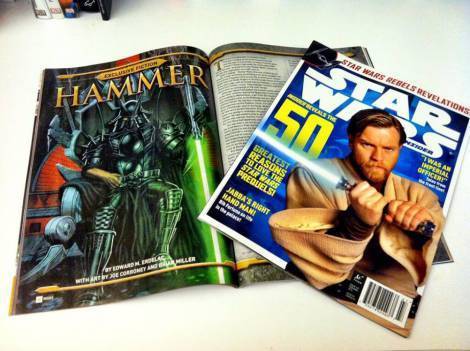 My first short story of 2014 premieres today in Star Wars Insider #147, marking my fictional return to the Star Wars Galaxy! Yep! Me! On actual, physical newsstands! Run out and grab it.
My first short story of 2014 premieres today in Star Wars Insider #147, marking my fictional return to the Star Wars Galaxy! Yep! Me! On actual, physical newsstands! Run out and grab it.
I’m always excited by the opportunity to add a bit of original fiction to a universe that’s been such a huge part of my childhood.
Hammer, which takes place in the final days of The Clone Wars, follows Telloti Cillmam’n, a troubled, envious Padawan washout regulated to the Jedi Explorer Corps who discovers an ancient Sith relic resting in a mysterious structure on the far-flung, ammonia-washed world of Nicht Ka. It also sees the birth of Malleus, an heir to the power of the glorious Sith dynasties of the past and the armor of a forgotten dark warrior called Warb Null.
Taking a page from some of my favorite fellow Star Wars contributors, Jason Fry and Dan Wallace, I thought I’d devote the old blog today to a couple of the in-universe Easter eggs and behind the scenes stuff for Hammer, and at the same time, showcase some of the awesome art Joe Corroney and Brian Miller did for the story.
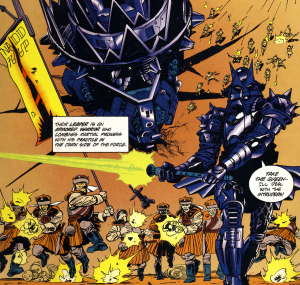 Firstly, Warb Null was the corrupted persona of a Naddist cultist named Shas Dovos on the planet Onderon 4,000 years before the events of Star Wars: A New Hope. He appeared in the Tales of The Jedi comic ‘The Freedon Nadd Uprising’ written by Tom Veitch for Dark Horse, and was further expanded in the West End Games RPG supplement for Tales of The Jedi. I always liked the design of the character as a sort of primeval proto-Vader in gleaming, almost Satanic black armor with a huge two handed lightsaber. Yeah he looks a bit like Sauron now, but remember, this was before the LOTOR movies so actually, Sauron looks like him. He gets taken out pretty quickly a la Darth Maul in the comic, but he stuck in my mind over the years, and I was always looking for an opportunity to do more with him.
Firstly, Warb Null was the corrupted persona of a Naddist cultist named Shas Dovos on the planet Onderon 4,000 years before the events of Star Wars: A New Hope. He appeared in the Tales of The Jedi comic ‘The Freedon Nadd Uprising’ written by Tom Veitch for Dark Horse, and was further expanded in the West End Games RPG supplement for Tales of The Jedi. I always liked the design of the character as a sort of primeval proto-Vader in gleaming, almost Satanic black armor with a huge two handed lightsaber. Yeah he looks a bit like Sauron now, but remember, this was before the LOTOR movies so actually, Sauron looks like him. He gets taken out pretty quickly a la Darth Maul in the comic, but he stuck in my mind over the years, and I was always looking for an opportunity to do more with him.
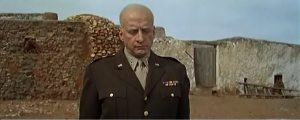 Part of the inspiration for Telloti’s personality was, believe it or not, George C. Scott’s portrayal of George S. Patton in the titular movie, Patton. There’s a quote in it that sums up Patton’s character – “There’s only one proper way for a professional soldier to die. That’s from the last bullet, of the last battle, of the last war.” This mantra is fortified when, after a political faux pas causes Patton to be removed from his battle command, he reacts to news of the Allied D-Day invasion by storming at his stoic valet, “The last great opportunity of a lifetime – an entire WORLD at war, and I’m left out of it? God will not permit this to happen! I WILL be ALLOWED to fulfill my destiny!” That last bit sort of became the springboard for the character for me. Telloti’s frustration at having failed to become a Jedi and being, in his mind, shuffled off to a harmless profession under the direction of a warrior who has lost the will to fight. Telloti wants glory, and all around him, his opportunities are passing him by. This mindset of course, combined with his temper, wind up making him fertile ground for the corruption of the Sith.
Part of the inspiration for Telloti’s personality was, believe it or not, George C. Scott’s portrayal of George S. Patton in the titular movie, Patton. There’s a quote in it that sums up Patton’s character – “There’s only one proper way for a professional soldier to die. That’s from the last bullet, of the last battle, of the last war.” This mantra is fortified when, after a political faux pas causes Patton to be removed from his battle command, he reacts to news of the Allied D-Day invasion by storming at his stoic valet, “The last great opportunity of a lifetime – an entire WORLD at war, and I’m left out of it? God will not permit this to happen! I WILL be ALLOWED to fulfill my destiny!” That last bit sort of became the springboard for the character for me. Telloti’s frustration at having failed to become a Jedi and being, in his mind, shuffled off to a harmless profession under the direction of a warrior who has lost the will to fight. Telloti wants glory, and all around him, his opportunities are passing him by. This mindset of course, combined with his temper, wind up making him fertile ground for the corruption of the Sith.
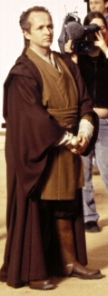 As a reader of wookieepedia, I’m a little obsessed with seeing unnamed background characters get an official moniker. The maimed Jedi master in the story, Ekim Ryelli, is meant to be the mulleted guy pictured in this still from Episode II: Attack Of The Clones. On wookieepedia he’s been called ‘Unidentified Balding Human Male Jedi,’ since the movie’s release, which is really a bit of a mouthful and not a very impressive name for a Jedi. So I asked Joe Corroney if he could use the guy in the arena in Episode II as a character model, if Leland Chee was OK with it, which I guess he was, ‘cause that’s him.
As a reader of wookieepedia, I’m a little obsessed with seeing unnamed background characters get an official moniker. The maimed Jedi master in the story, Ekim Ryelli, is meant to be the mulleted guy pictured in this still from Episode II: Attack Of The Clones. On wookieepedia he’s been called ‘Unidentified Balding Human Male Jedi,’ since the movie’s release, which is really a bit of a mouthful and not a very impressive name for a Jedi. So I asked Joe Corroney if he could use the guy in the arena in Episode II as a character model, if Leland Chee was OK with it, which I guess he was, ‘cause that’s him.
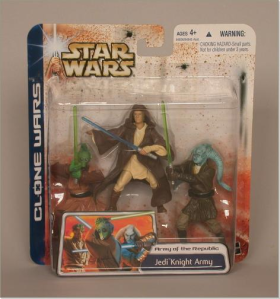
Lumas Etima front and center
For Ekim’s padawan, I needed another combatant in the Petranaki arena on Geonosis from Ep II, in this case, one that hadn’t made it back. I found Lumas Etima in one of Leland Chee’s blogs on the Geonosis battle, and in Pablo Hidalgo’s Complete Star Wars Encyclopedia. He’s another guy with an on screen appearance, but he one-ups his master as Hasbro made a figure of him at some point (this and bounty hunter Bane Malar make two Star Wars figures I’ve written backgrounds for – coolness!).
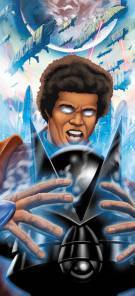 At one point in the story, Telloti’s mind is flooded with visions of the ancient past, in which he sees another armored Sith warrior, and hears his name chanted. This is King Adas, an ancient overlord of the Sith stronghold world Korriban. The spirit which inhabits the spellbook which Shas Dovos uses to craft the Warb Null armor is never named, and I don’t name him here, but I can’t help but see an aesthetic allusion to Adas in the design of Null’s ebony armor…
At one point in the story, Telloti’s mind is flooded with visions of the ancient past, in which he sees another armored Sith warrior, and hears his name chanted. This is King Adas, an ancient overlord of the Sith stronghold world Korriban. The spirit which inhabits the spellbook which Shas Dovos uses to craft the Warb Null armor is never named, and I don’t name him here, but I can’t help but see an aesthetic allusion to Adas in the design of Null’s ebony armor…
The last points are mainly trivia. Since my first contributions to Star Wars in the old Database and my story Fists of Ion, I’ve always played around with portmanteaus in my character naming, as a lot of authors I know do. I don’t feel a Star Wars piece is complete till I’ve included the name of a loved one, in particular, my children, who have become the main driving force between any ambitions I have as a writer since they’ve come into my life.
Wollwi Enan, the girl padawan who Telloti mentions as having defeated him during the Apprentice Trial, is named for my middle daughter, Willow Anne, and the Givin astrogator (Givin are my favorite Star Wars alien species) Staguu Itincoovar for my son, August Victoriano.
Welp, that’s all folks. Hope you enjoy the story.
May The Force Be With You!

Art imitates life


December 20, 2013
The Searchers: Why Scar Is Played By A White Guy
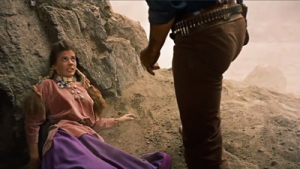 So this I’m posting this as a gut reaction-response whatever to something this critic said in his article on re-evaluating classic films.
So this I’m posting this as a gut reaction-response whatever to something this critic said in his article on re-evaluating classic films.
The merit of the whole thing is a bit dubious to me.
http://www.theguardian.com/film/filmblog/2013/dec/19/why-re-evalute-films-once-great-queenan
If you think The Maltese Falcon is boring and 2001 is endless…well, OK. That’s a matter of taste I guess, though I personally question the prowess of a self professed film critic who touts Dirty Dancing over any of those (and I like Dirty Dancing).
Anyway, the thing that stuck out to me was a criticism I hear leveled at one of my favorite movies, John Ford’s western, The Searchers.
Ethan kissing his brother’s wife…Ward Bond is obviously aware of the situation.
The Searchers is much more complex then modern viewers tend to give it credit for. It’s a nuanced study of racism, with the central concern being John Wayne’s Ethan Edwards relentless pursuit of his niece Natalie Wood, who has been kidnapped by Comanche Indians. Ethan is of the school of frontier thought that posits she may be better off dead than in the arms of ‘a Comanche buck.’ While his intent seems to be clear, his main motivation is revenge against the ones who killed his brother’s wife, a woman he obviously had some history with prior to the war. He is in fact wrestling with just what he intends to do with his niece once he finds her.
Now newcomers to The Searchers often complain about the folksy trademark Ford humor not gelling with the gravitas of the rest of the film. I can understand this criticism.
What I don’t get is the near universal critique of the Comanche antagonist Chief Scar being portrayed by white German American actor Henry Brandon. People say it undercuts the stance against racism which the film portends to take.
I’ve searched the internet, and I’m amazed to find nobody saying what I’ve always suspected about Brandon’s casting.
Scar wasn’t born a Comanche.
He’s a white captive inducted into the tribe.
Blue eyed Cynthia Anne Parker with one of her Comanche children
Historically, this kind of thing happened all the time on the frontier – and John Ford was an avid student of western history. He knew about Cynthia Ann Parker who was captured by Comanches as a girl, and her half Comanche son Quanah who rose to prominence as a chief of the Kwahadi band in the 1870′s. In fact, I’ve read western historians who’ve remarked on the similarities between The Searchers and the Parker story. The original writer of the story The Searchers was based upon certainly knew it.
But you don’t need to be a western history buff to see this. It’s plain in the movie.
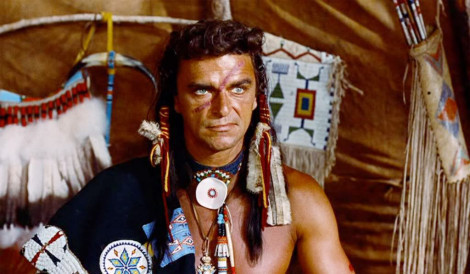 Scar has bright blue Peter O’Toole eyes. Of course he’s obviously a white man. He’s not supposed to be an Indian.
Scar has bright blue Peter O’Toole eyes. Of course he’s obviously a white man. He’s not supposed to be an Indian.
In a picture where every other Native American on screen was portrayed by Navajo extras and Mexicans were played by Mexican actors, not Burt Lancaster or John Saxon with shoe polish in their mustaches, doesn’t anybody think John Ford’s casting of the main antagonist would’ve been deliberate?
The notion that Scar is a white man is further born out in an exchange between Ethan and Scar after their first face to face meeting.
“You talk pretty good American,” Ethan growls, “for a COMANCH.” (Wayne’s own emphasis)
and Scar
“You speak pretty good Comanch.”
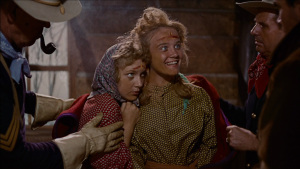 Ethan Edwards knows Scar is a white man raised by Comanches. Scar is everything Ethan hates. What he doesn’t want his niece to become, what he himself, it can be argued, is in danger of becoming It’s foreshadowed in his reaction to the two slightly crazed white captives he finds with the cavalry earlier in the picture (women who are not crazy because they’re Comanche, but, judging from the one woman’s reaction to the doll, likely bore witness to a cavalry massacre). It’s been theorized elsewhere that Ethan has some unknown past with the Comanche perhaps prior to the war. His fringed rifle scabbard and ability to speak to the Indians or at least comprehend their language is evidence of this.
Ethan Edwards knows Scar is a white man raised by Comanches. Scar is everything Ethan hates. What he doesn’t want his niece to become, what he himself, it can be argued, is in danger of becoming It’s foreshadowed in his reaction to the two slightly crazed white captives he finds with the cavalry earlier in the picture (women who are not crazy because they’re Comanche, but, judging from the one woman’s reaction to the doll, likely bore witness to a cavalry massacre). It’s been theorized elsewhere that Ethan has some unknown past with the Comanche perhaps prior to the war. His fringed rifle scabbard and ability to speak to the Indians or at least comprehend their language is evidence of this.
Scar being a white man feels to me has always felt like a deliberate choice by Ford which adds another layer to every bit of dialogue between Wayne and Brandon, another level to the entire movie.
Apologies if I’m mistaken and this has been posited elsewhere.


December 16, 2013
The Big Giveaway Contest
With the Christmas holiday approaching and me having completed the last of my convention appearances for the year, I thought it’d be fun to clear out a little book stock and give you all an end of the year contest.
Normally I just do the usual first five postings thing, but I decided to do something interesting this time out. Below is an excerpt from the final book in my Judeocentric/Lovecraftian weird western series, Merkabah Rider: Once Upon A Time In the Weird West. I like to include little easter eggs in my books, references to things that have inspired me, links to other worlds and characters in the grand fictional multiverse of the collective consciousness, and Merkabah Rider is full of them. Besides the historical characters who pop up from time to time, in the various books I’ve tied the world of the Rider to among other things, Solomon Kane, King Arthur, Quantum Leap, and Doctor Who.
The following passage contains seven references to various books and movies (a hint: three of the names mentioned are part of one reference). Send a list of what they are and where they come from to emerdelacATgmail.com. It’s an open internet test so it probably won’t be too hard. The person with the most correct answers gets the whole enchilada – a signed set of the complete Merkabah Rider series….so if it’s something you’ve been curious to try and haven’t yet, here’s your chance to get the whole series free of charge.
If multiple people get all seven, I’ll choose four winners at random. First place gets the set, second place gets a signed copy of my latest release, Coyote’s Trail. Third place gets a signed copy of Terovolas. Fourth gets a signed copy of Buff Tea. Take a look at the links on the right, click on the book covers to see what each title is about and read a sample from each, if you like.
In the excerpt below there is also an eighth, bonus reference not to a book or a movie. Name it with your picks and I’ll include something random.
And here’s another thing. Even if you don’t feel like looking all this up/don’t know it/don’t care….from now until 11:59PM Pacific December 19th, just drop me an email and you can have one e-copy of anything I’ve written (that I have e-copies of) abso-smurfly free. Limit one per response/email.
I’ll leave the contest open from now until midnight December 20th when I’ll pick and announce the winners and get ‘em in the mail for you by the 21st.
Here’s the excerpt….
In the Todos Mis Amigos cantina, the jeers and passions rose to a fevered pitch around the starkly lit fighting sand, as the black rooster Zorro rose fluttering and sunk its spur into the red shoulder of Gallo del Cielo. Blood flecked out on the sand and fortunes quivered and changed hands.
Among the shadowed patrons sweating tequila over fistfuls of hard earned money, swirling in the dreamy clouds of cigarro smoke, dozens of dramas unfolded that had no bearing upon the mortal battle of the roosters, and yet were reflected in their combat. Red Headed Slim Reezer pondered the betrayal of his partner Jesse McLaughlin. Young Oscar Diggs swore if the black won he would never set foot in Kansas again. A miner named Richard Wilkins III sipped mescal, guessing if the world were still here after tomorrow, maybe he would see what California was like. Lin McAdams waited for High Spade to return with the beer, and thought about the woman sleeping in his hotel room, wondered whether she could love a man that killed his own brother. Freddie Sykes propped a fresh corpse in the corner, pulling the dead man’s hat over his staring face and wiping his knife on his knee, trying to decide if this would affect the bank job he and Dog Kelly had planned for tomorrow, wondering for the twentieth time why he didn’t just find a señorita somewhere and retire. John Russell watched the barbaric exultations of the Indah stoically, inwardly aghast that he was one of them. A giggling woman passed a little white card back to the bespectacled gringo on whose knee she was perched and asked;
“What means ‘Electricisto y Aventurero?”
—–
Hasta pronto! Good luck, and Merry Christmas.


December 5, 2013
If You’re Ever Down In Texas Look Me Up -Weird West Fest
Hey all, I’ll be appearing at the Weird West Fest in Giddings, Texas next weekend, December 14th (it was originally this Saturday the 7th, but the whole shebang has been rescheduled due to inclement weather).
I’ll be on the weird western panel from 2-2:30, and the HWA panel with Karen Lansdale (HWA founder and wife of Joe R. Lansdale) from 3:00-3:30.
I’ll be hawking books all day as well somewhere among the vendors, so if you’ve got the money, I’ve got the time (or just swing by for an autograph or to say hi).
Should be a cool convention, as the lions share of it will be taking place in a restored 1880′s Train Depot and all of the Lansdales will be around, including Joe R., whose work my readers will know is a big inspiration for Merkabah Rider and a lot of what I do.
Check the link.
Hasta Pronto!


November 22, 2013
Slugthrowers: A Look At Popular Music In A Galaxy Far, Far Away
Part 1 of Slughtrowers – my article on popular in-universe music in a Galaxy Far Far Away is up over on Lucasfilm’s official Star Wars site, so go give it a look here…


November 18, 2013
DT Moviehouse Review: Bronco Billy
Time once more for my blog feature, DT Moviehouse Reviews, in which I make my way alphabetically through my 200+ DVD/Blu-Ray collection (you can see the list right here) and decide if each one was worth the money. Today I review Clint Eastwood’s Bronco Billy.
(1960) Directed by Clint Eastwood
Screenplay by Dennis Hacken
Tagline: The most outrageous of ‘em all.
What It’s About:
Frigid spoiled heiress Antoinette Lily (Sondra Locke), left high and dry in a cheap hotel by her newlywed money grubbing husband (Geoffrey Lewis), is forced to throw in her lot with a traveling wild west show led by posturing cowboy trick shooter Bronco Billy McCoy (Clint Eastwood) and featuring a retinue of cheerful outcast ex-cons.
Why I Bought It:
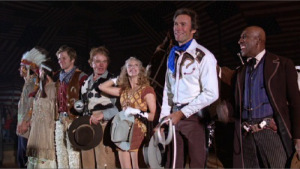 “I’ve got a special message for you little pardners out there. I want you to finish your oatmeal at breakfast and do as your mom and pa tell you because they know best. Don’t ever tell a lie and say your prayers at night before you go to bed. And as our friends south of the border say, ‘Adios, amigos.’”
“I’ve got a special message for you little pardners out there. I want you to finish your oatmeal at breakfast and do as your mom and pa tell you because they know best. Don’t ever tell a lie and say your prayers at night before you go to bed. And as our friends south of the border say, ‘Adios, amigos.’”
Bronco Billy is the most unlikely movie to come out of Clint Eastwood’s repertoire since Paint Your Wagon, but it’s also one of my favorites.
Imagine One Flew Over The Cuckoo’s Nest and Cool Hand Luke brought to you by John Ford with help from Roy Rogers and Dale Evans.
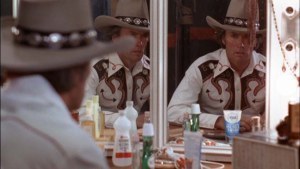 Eastwood takes his tough guy persona and flips it on its ear, turning in a winsome performance as a New Jersey shoe salesman and ex-convict who is living his dream of being a rootin’ tootin’ buckaroo, surrounding himself with a bevy of likeminded souls (and fellow ex-cons), including barker Doc Lynch (Scatman Cruthers), hook-handed wrangler Lefty LeBow (Bill McKinney), snake handling Apache dancer and struggling writer Chief Big Eagle (Dan Vadis) and his wife Running Water (Sierra Pecheur), and boyish roper and Army deserter Leonard James (Sam Bottoms). There’s a nice cameo by Hank Worden (Mose from The Searchers) as a gas station attendant too.
Eastwood takes his tough guy persona and flips it on its ear, turning in a winsome performance as a New Jersey shoe salesman and ex-convict who is living his dream of being a rootin’ tootin’ buckaroo, surrounding himself with a bevy of likeminded souls (and fellow ex-cons), including barker Doc Lynch (Scatman Cruthers), hook-handed wrangler Lefty LeBow (Bill McKinney), snake handling Apache dancer and struggling writer Chief Big Eagle (Dan Vadis) and his wife Running Water (Sierra Pecheur), and boyish roper and Army deserter Leonard James (Sam Bottoms). There’s a nice cameo by Hank Worden (Mose from The Searchers) as a gas station attendant too.
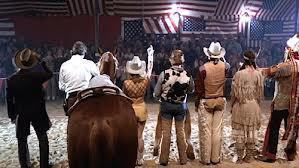 The cast is just as likable as can be, solidly carrying Eastwood’s nostalgic, idealistic message of the dream of the American West, namely, that you can reinvent yourself on the ‘frontier’ of society, that America itself is a land of slightly crazy, individualistic characters, a message no more readily apparent than when, after their show tent accidentally burns down, Billy has a new one sewn together out of American flags stitched by patients at a mental hospital. Running Water says plainly, “Do you understand what Bronco Billy and the wild west show are all about? You can be anything you want. All you have to do is go out and become it!”
The cast is just as likable as can be, solidly carrying Eastwood’s nostalgic, idealistic message of the dream of the American West, namely, that you can reinvent yourself on the ‘frontier’ of society, that America itself is a land of slightly crazy, individualistic characters, a message no more readily apparent than when, after their show tent accidentally burns down, Billy has a new one sewn together out of American flags stitched by patients at a mental hospital. Running Water says plainly, “Do you understand what Bronco Billy and the wild west show are all about? You can be anything you want. All you have to do is go out and become it!”
It’s a passion project on every level, as far from the gritty realism of Unforgiven as a hawk from the moon. It’s full of John Ford corn and dopey situations, but like the exploits of a spangled Gene Autry, I can’t help but grin watching it.
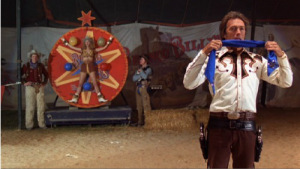 The central storyline of course, is Billy’s romance of the ice hearted, materialistic Lily, and of her eventual sort of Taoist-coming-around to rejecting the lovelessness her extreme wealth has engendered in her in favor of Billy’s all accepting, all-encompassing dream. At first, nobody much warms to her as Billy’s assistant. Her job is to look pretty, say her lines (Billy doesn’t approve of her early improvisation) and spin on a wheel while Billy (blindfolded) shoots targets and throws a knife at a balloon between her knees. Conversely, she can’t understand the people she’s with. In one early scene, she tries to make idle conversation with Lefty, who rankles at her talking.
The central storyline of course, is Billy’s romance of the ice hearted, materialistic Lily, and of her eventual sort of Taoist-coming-around to rejecting the lovelessness her extreme wealth has engendered in her in favor of Billy’s all accepting, all-encompassing dream. At first, nobody much warms to her as Billy’s assistant. Her job is to look pretty, say her lines (Billy doesn’t approve of her early improvisation) and spin on a wheel while Billy (blindfolded) shoots targets and throws a knife at a balloon between her knees. Conversely, she can’t understand the people she’s with. In one early scene, she tries to make idle conversation with Lefty, who rankles at her talking.
“I was just trying to make the time pass by more quickly.”
“What the hell you wanna make the time pass by more quickly for?”
Lily gradually learns the true identities of the show performers as her time with them progresses, expressing indignation at their colored and criminal pasts, but warming to their genuine familial fondness of each other. There’s a great turning point scene when Big Eagle and Running Water sheepishly admit to Billy before a show that they’re going to have a baby. Knowing full well the show’s constant financial trouble (the outfit is strictly subsistence – they haven’t been paid by Billy in months) they’re fearful of his reaction to the news he will have another mouth to feed. “What?!” Billy says when they tell him. He promptly draws his matched revolvers and fires them into the air in cartoonish celebration, busting into a broad grin. He declares it’s time for a celebration and leads the grinning parents-to-be (and the others, who naturally come running at the gunshots) out, while we see Lily sitting in the corner watching them with obvious envy.
Is it dated? Most certainly, but so what?
Sexist? Probably. When Billy attempts to seduce Lily in a cot in the ‘honeymoon suite’ of the mental asylum, she sneers;
“I find your timing less than appropriate.”
To which he replies in mock innocence,
“Oh. Is it that time of the month?”
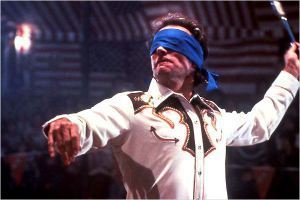 Also, it’s a Sondra Locke/Eastwood outing so Locke does get saved from attempted rape in the parking lot. I took a class on Eastwood in college and one girl in class wondered if Eastwood and Locke roleplayed this scenario a lot when they were married. I have no idea, but it is an oddly ubiquitous happening in all the films they made together…
Also, it’s a Sondra Locke/Eastwood outing so Locke does get saved from attempted rape in the parking lot. I took a class on Eastwood in college and one girl in class wondered if Eastwood and Locke roleplayed this scenario a lot when they were married. I have no idea, but it is an oddly ubiquitous happening in all the films they made together…
Nevertheless, Bronco Billy is worth a watch, if you’ve got the heart for it.
Best Dialogue/Line:
After Billy and the gang lose their tent and fail to successfully rob a train, they decide to hole up in a mental institution for a few days (Billy’s show is welcome at orphanages and asylums alike, as reciprocation for Billy putting on free shows for the kids and patients). The kindly wannabe cowboy administrator welcomes them with this line;
“You and your gang can hole up here for as long as you like. You can take your meals with the staff or the patients – whomever you feel more comfortable with.”
Best Scene:
It’s a minor scene, but I always chuckle at Sondra Locke’s over the top heiress on her sham ‘wedding night’ with Geoffrey Lewis.
Lewis and Locke are marrying solely out of financial convenience. Locke can’t get her inheritance without being married by the age of thirty, and Lewis is on the skids. Yet he still apparently holds out hope for some intimacy and disrobes in an eager hurry, only to have Locke come out of the bathroom with a thick pea green mud mask on her face.
As they lay down to bed, Locke warns him that he is not allowed to touch her without first asking permission, at peril of being disinherited.
She flicks the lights out, and after about thirty seconds of silent, total darkness, Lewis whispers tentatively;
“Darling? May I put my hand on your breast?”
“NO,” intones Locke with imperious finality.
Next In The Queue: Buffalo Soldiers


October 31, 2013
The Man And The Snake by Ambrose Bierce
I’m taking a page from author of the Weird Ted E. Grau’s great blog the Cosmicomicon, who inspired by our talk about one of my favorite writers and biggest influences, Ambrose Bierce, read the dark, disturbing short story Oil of Dog and was affected enough to post it there.
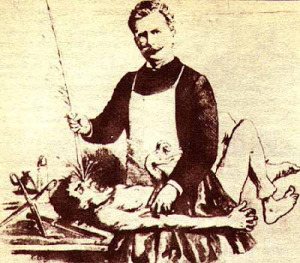 I talked a lot about Robert E. Howard on these pages, but I don’t give enough credit to Bitter Bierce, one of my favorite writers, almost a character in a weird novel himself. If you’ve never read him beyond Occurence At Owl Creek Bridge or snippets of his dry, biting Devil’s Dictionary, you’re missing out on one of the dark pioneers of horror and Weird fiction. He was the only guy to write vivid fiction about the Civil War who was actually a combat veteran, became a renowned journalist in San Francisco who rubbed elbows with Mark Twain and The Emperor Norton I, and mysteriously ended his days somewhere down in Mexico looking for Pancho Villa.
I talked a lot about Robert E. Howard on these pages, but I don’t give enough credit to Bitter Bierce, one of my favorite writers, almost a character in a weird novel himself. If you’ve never read him beyond Occurence At Owl Creek Bridge or snippets of his dry, biting Devil’s Dictionary, you’re missing out on one of the dark pioneers of horror and Weird fiction. He was the only guy to write vivid fiction about the Civil War who was actually a combat veteran, became a renowned journalist in San Francisco who rubbed elbows with Mark Twain and The Emperor Norton I, and mysteriously ended his days somewhere down in Mexico looking for Pancho Villa.
This Halloween I thought I’d share this great public domain short story, which, in the spirit of the day, explores the nature of fear and is frankly, hilarious.
Boo!
THE MAN AND THE SNAKE – Ambrose Bierce
I
It is of veritabyll report, and attested of so many that there be nowe of wyse and learned none to gaynsaye it, that ye serpente hys eye hath a magnetick propertie that whosoe falleth into its svasion is drawn forwards in despyte of his wille, and perisheth miserabyll by ye creature hys byte.
Stretched at ease upon a sofa, in gown and slippers, Harker Brayton smiled as he read the foregoing sentence in old Morryster’s “Marvells of Science.” “The only marvel in the matter,” he said to himself, “is that the wise and learned in Morryster’s day should have believed such nonsense as is rejected by most of even the ignorant in ours.”
A train of reflections followed–for Brayton was a man of thought– and he unconsciously lowered his book without altering the direction of his eyes. As soon as the volume had gone below the line of sight, something in an obscure corner of the room recalled his attention to his surroundings. What he saw, in the shadow under his bed, were two small points of light, apparently about an inch apart. They might have been reflections of the gas jet above him, in metal nail heads; he gave them but little thought and resumed his reading. A moment later something–some impulse which it did not occur to him to analyze–impelled him to lower the book again and seek for what he saw before. The points of light were still there. They seemed to have become brighter than before, shining with a greenish luster which he had not at first observed. He thought, too, that they might have moved a trifle–were somewhat nearer. They were still too much in the shadow, however, to reveal their nature and origin to an indolent attention, and he resumed his reading. Suddenly something in the text suggested a thought which made him start and drop the book for the third time to the side of the sofa, whence, escaping from his hand, it fell sprawling to the floor, back upward. Brayton, half-risen, was staring intently into the obscurity beneath the bed, where the points of light shone with, it seemed to him, an added fire. His attention was now fully aroused, his gaze eager and imperative. It disclosed, almost directly beneath the foot rail of the bed, the coils of a large serpent–the points of light were its eyes! Its horrible head, thrust flatly forth from the innermost coil and resting upon the outermost, was directed straight toward him, the definition of the wide, brutal jaw and the idiotlike forehead serving to show the direction of its malevolent gaze. The eyes were no longer merely luminous points; they looked into his own with a meaning, a malign significance.
II
A snake in a bedroom of a modern city dwelling of the better sort is, happily, not so common a phenomenon as to make explanation altogether needless. Harker Brayton, a bachelor of thirty-five, a scholar, idler, and something of an athlete, rich, popular, and of sound health, had returned to San Francisco from all manner of remote and unfamiliar countries. His tastes, always a trifle luxurious, had taken on an added exuberance from long privation; and the resources of even the Castle Hotel being inadequate for their perfect gratification, he had gladly accepted the hospitality of his friend, Dr. Druring, the distinguished scientist. Dr. Druring’s house, a large, old-fashioned one in what was now an obscure quarter of the city, had an outer and visible aspect of reserve. It plainly would not associate with the contiguous elements of its altered environment, and appeared to have developed some of the eccentricities which come of isolation. One of these was a “wing,” conspicuously irrelevant in point of architecture, and no less rebellious in the matter of purpose; for it was a combination of laboratory, menagerie, and museum. It was here that the doctor indulged the scientific side of his nature in the study of such forms of animal life as engaged his interest and comforted his taste–which, it must be confessed, ran rather to the lower forms. For one of the higher types nimbly and sweetly to recommend itself unto his gentle senses, it had at least to retain certain rudimentary characteristics allying it to such “dragons of the prime” as toads and snakes. His scientific sympathies were distinctly reptilian; he loved nature’s vulgarians and described himself as the Zola of zoology. His wife and daughters, not having the advantage to share his enlightened curiosity regarding the works and ways of our ill-starred fellow-creatures, were, with needless austerity, excluded from what he called the Snakery, and doomed to companionship with their own kind; though, to soften the rigors of their lot, he had permitted them, out of his great wealth, to outdo the reptiles in the gorgeousness of their surroundings and to shine with a superior splendor.
Architecturally, and in point of “furnishing,” the Snakery had a severe simplicity befitting the humble circumstances of its occupants, many of whom, indeed, could not safely have been intrusted with the liberty which is necessary to the full enjoyment of luxury, for they had the troublesome peculiarity of being alive. In their own apartments, however, they were under as little personal restraint as was compatible with their protection from the baneful habit of swallowing one another; and, as Brayton had thoughtfully been apprised, it was more than a tradition that some of them had at divers times been found in parts of the premises where it would have embarrassed them to explain their presence. Despite the Snakery and its uncanny associations–to which, indeed, he gave little attention–Brayton found life at the Druring mansion very much to his mind.
III
Beyond a smart shock of surprise and a shudder of mere loathing, Mr. Brayton was not greatly affected. His first thought was to ring the call bell and bring a servant; but, although the bell cord dangled within easy reach, he made no movement toward it; it had occurred to his mind that the act might subject him to the suspicion of fear, which he certainly did not feel. He was more keenly conscious of the incongruous nature of the situation than affected by its perils; it was revolting, but absurd.
The reptile was of a species with which Brayton was unfamiliar. Its length he could only conjecture; the body at the largest visible part seemed about as thick as his forearm. In what way was it dangerous, if in any way? Was it venomous? Was it a constrictor? His knowledge of nature’s danger signals did not enable him to say; he had never deciphered the code.
If not dangerous, the creature was at least offensive. It was de trop–”matter out of place”–an impertinence. The gem was unworthy of the setting. Even the barbarous taste of our time and country, which had loaded the walls of the room with pictures, the floor with furniture, and the furniture with bric-a-brac, had not quite fitted the place for this bit of the savage life of the jungle. Besides–insupportable thought!–the exhalations of its breath mingled with the atmosphere which he himself was breathing!
These thoughts shaped themselves with greater or less definition in Brayton’s mind, and begot action. The process is what we call consideration and decision. It is thus that we are wise and unwise. It is thus that the withered leaf in an autumn breeze shows greater or less intelligence than its fellows, falling upon the land or upon the lake. The secret of human action is an open one–something contracts our muscles. Does it matter if we give to the preparatory molecular changes the name of will?
Brayton rose to his feet and prepared to back softly away from the snake, without disturbing it, if possible, and through the door. People retire so from the presence of the great, for greatness is power, and power is a menace. He knew that he could walk backward without obstruction, and find the door without error. Should the monster follow, the taste which had plastered the walls with paintings had consistently supplied a rack of murderous Oriental weapons from which he could snatch one to suit the occasion. In the meantime the snake’s eyes burned with a more pitiless malevolence than ever.
Brayton lifted his right foot free of the floor to step backward. That moment he felt a strong aversion to doing so.
“I am accounted brave,” he murmured; “is bravery, then, no more than pride? Because there are none to witness the shame shall I retreat?”
He was steadying himself with his right hand upon the back of a chair, his foot suspended.
“Nonsense!” he said aloud; “I am not so great a coward as to fear to seem to myself afraid.”
He lifted the foot a little higher by slightly bending the knee, and thrust it sharply to the floor–an inch in front of the other! He could not think how that occurred. A trial with the left foot had the same result; it was again in advance of the right. The hand upon the chair back was grasping it; the arm was straight, reaching somewhat backward. One might have seen that he was reluctant to lose his hold. The snake’s malignant head was still thrust forth from the inner coil as before, the neck level. It had not moved, but its eyes were now electric sparks, radiating an infinity of luminous needles.
The man had an ashy pallor. Again he took a step forward, and another, partly dragging the chair, which, when finally released, fell upon the floor with a crash. The man groaned; the snake made neither sound nor motion, but its eyes were two dazzling suns. The reptile itself was wholly concealed by them. They gave off enlarging rings of rich and vivid colors, which at their greatest expansion successively vanished like soap bubbles; they seemed to approach his very face, and anon were an immeasurable distance away. He heard, somewhere, the continual throbbing of a great drum, with desultory bursts of far music, inconceivably sweet, like the tones of an aeolian harp. He knew it for the sunrise melody of Memnon’s statue, and thought he stood in the Nileside reeds, hearing, with exalted sense, that immortal anthem through the silence of the centuries.
The music ceased; rather, it became by insensible degrees the distant roll of a retreating thunderstorm. A landscape, glittering with sun and rain, stretched before him, arched with a vivid rainbow, framing in its giant curve a hundred visible cities. In the middle distance a vast serpent, wearing a crown, reared its head out of its voluminous convolutions and looked at him with his dead mother’s eyes. Suddenly this enchanting landscape seemed to rise swiftly upward, like the drop scene at a theater, and vanished in a blank. Something struck him a hard blow upon the face and breast. He had fallen to the floor; the blood ran from his broken nose and his bruised lips. For a moment he was dazed and stunned, and lay with closed eyes, his face against the door. In a few moments he had recovered, and then realized that his fall, by withdrawing his eyes, had broken the spell which held him. He felt that now, by keeping his gaze averted, he would be able to retreat. But the thought of the serpent within a few feet of his head, yet unseen–perhaps in the very act of springing upon him and throwing its coils about his throat–was too horrible. He lifted his head, stared again into those baleful eyes, and was again in bondage.
The snake had not moved, and appeared somewhat to have lost its power upon the imagination; the gorgeous illusions of a few moments before were not repeated. Beneath that flat and brainless brow its black, beady eyes simply glittered, as at first, with an expression unspeakably malignant. It was as if the creature, knowing its triumph assured, had determined to practice no more alluring wiles.
Now ensued a fearful scene. The man, prone upon the floor, within a yard of his enemy, raised the upper part of his body upon his elbows, his head thrown back, his legs extended to their full length. His face was white between its gouts of blood; his eyes were strained open to their uttermost expansion. There was froth upon his lips; it dropped off in flakes. Strong convulsions ran through his body, making almost serpentine undulations. He bent himself at the waist, shifting his legs from side to side. And every movement left him a little nearer to the snake. He thrust his hands forward to brace himself back, yet constantly advanced upon his elbows.
IV
Dr. Druring and his wife sat in the library. The scientist was in rare good humor.
“I have just obtained, by exchange with another collector,” he said, “a splendid specimen of the Ophiophagus.”
“And what may that be?” the lady inquired with a somewhat languid interest.
“Why, bless my soul, what profound ignorance! My dear, a man who ascertains after marriage that his wife does not know Greek, is entitled to a divorce. The Ophiophagus is a snake which eats other snakes.”
“I hope it will eat all yours,” she said, absently shifting the lamp. “But how does it get the other snakes? By charming them, I suppose.”
“That is just like you, dear,” said the doctor, with an affectation of petulance. “You know how irritating to me is any allusion to that vulgar superstition about the snake’s power of fascination.”
The conversation was interrupted by a mighty cry which rang through the silent house like the voice of a demon shouting in a tomb. Again and yet again it sounded, with terrible distinctness. They sprang to their feet, the man confused, the lady pale and speechless with fright. Almost before the echoes of the last cry had died away the doctor was out of the room, springing up the staircase two steps at a time. In the corridor, in front of Brayton’s chamber, he met some servants who had come from the upper floor. Together they rushed at the door without knocking. It was unfastened, and gave way. Brayton lay upon his stomach on the floor, dead. His head and arms were partly concealed under the foot rail of the bed. They pulled the body away, turning it upon the back. The face was daubed with blood and froth, the eyes were wide open, staring–a dreadful sight!
“Died in a fit,” said the scientist, bending his knee and placing his hand upon the heart. While in that position he happened to glance under the bed. “Good God!” he added; “how did this thing get in here?”
He reached under the bed, pulled out the snake, and flung it, still coiled, to the center of the room, whence, with a harsh, shuffling sound, it slid across the polished floor till stopped by the wall, where it lay without motion. It was a stuffed snake; its eyes were two shoe buttons.
—-HAPPY HALLOWEEN LADIES!



